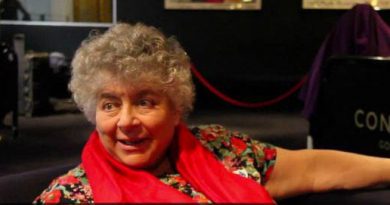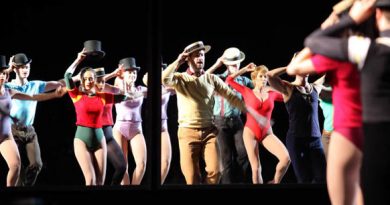Merrily We Hum Along, or A beginner’s guide to musicals
Ben van Tienen graduated from Sydney Conservatorium of Music in 2007, earning first class honours and the university medal. He regularly appears as a pianist with Sydney Symphony, Gondwana Choirs, Sydney Philharmonia Choirs, Opera Australia, Auckland Philharmonia, and as guest principal keyboardist for the Tasmanian Symphony Orchestra.
Ben is currently the Associate Musical Director of Wicked in Singapore, and AussieTheatre welcomes him as a guest writer.
Ok. I give in. I can’t take it any more!
(Yes, agreed. Very melodramatic opening. But I work in music theatre. Pretty sure that’s a defense.)
I was waking up this morning, innocently drinking a coffee and surfing the net (don’t you think that’s a nice way to start the day? I think that’s a nice way to start the day) and I read a sentence that awoke my intense wrath like nothing else can.
“You can’t exactly leave the theatre humming a theme from the show.”
Yes, that’s right. The old “hummable” thing. OH, IT MAKES ME EXTREMELY ANGRY. Just as angry as the witch when she finds out that Snow White is still alive. So angry I would like to chop off my nipples in order to relieve the pain.
It upsets me immeasurably that “it’s not hummable or memorable” is still thought to be a valid criticism of a music theatre score. I think the last time I felt so vehemently about it was when Rob Marshall’s movie version of Nine was released. The score is by Maury Yeston (widely acknowledged as someone who can write a pretty sweeping melody – think of the scores for Titanic and Grand Hotel). Granted, the movie didn’t do much for his score; sweeping melodies don’t sound great when they’re sung by non-singers. Thus, all the reviews I read pretty much universally said, “there are some great performances, but the score isn’t particularly memorable.”
I’m sorry? Who are you? Oh, that’s right. A film critic. So, why are allowed to make such a quick and damning judgment about something which isn’t your forte?
Anyway, this morning, I got to thinking. (No smart comments or you’ll be sorry.)
When one writes, “the score isn’t very memorable,” what one actually is writing is, “I couldn’t remember any of it when I left the theatre.” That’s fine. That’s ok, even. But, why do we judge music theatre by that criterion, when we judge no other art in the same way? Imagine transferring such a statement to other art forms.
Leaving an art exhibition: “It was fine, but when I left I couldn’t visualise any of the main colours used.” Reviewing a new symphony: “when I got to interval, I couldn’t remember the second subject of the first movement.” Listening to Lady Gaga’s new single: “Well, I listened to it once, and I can’t even remember one note of it.” Would we really take such a criticism seriously? I don’t think so. I think we might even laugh at the reviewers naivety.
I realise that by now you’re probably laughing at my naivety. “Ben, Ben, Ben,” you’re thinking, “Memorable scores exist. When I go and hear Rodgers and Hammerstein or Andrew Lloyd Webber, I leave the theatre humming the score. See? It’s possible. We simply don’t have music theatre composers of that calibre any more.”
AHA! Let’s talk about that. Bear with me here.
I’d like to propose a bold statement. Drum roll, please. Unless you’re a ridiculous musical genius, the only way that you’re going to remember a theme is if you’ve heard it repeatedly. Let’s take, for example, “Some Enchanted Evening,” from the very wonderful, undisputably genius score, South Pacific. Pretend, if you can, that you’ve never heard it before.
Well, the first time you hear it is in the first five minutes: it’s featured quite prominently in the overture. You don’t know what the song is yet, and you might even be talking while it’s played, but it’s still registered with your ears. So then when the song comes up in the actual plot, it already sounds familiar. It’s sung in this gorgeous operatic baritone voice and accompanied by about 17 violins and it’s so romantic that it floors you. You hear it again at the very end of the first act, in a big dramatic version. So you spend interval thinking about it over your glass of champagne. You sit back down for act two. It’s featured in the entr’acte, again before the curtain has even risen. It has a reprise in the second act, this time sung by the female lead. And then when you leave the theatre, the orchestra is still playing it, during the Playout music.
That’s six times, ladies and gentlemen. SIX TIMES in the course of one evening. The composer and orchestrator have engineered this (it’s no accident!) You’ve heard it so many times that if you *don’t* leave the theatre humming it, you must actually be a robot. We could make the same theory apply to a song like “People Will Say We’re In Love” from Oklahoma! Even if a song is not reprised in the show at all, (eg I Could Have Danced All Night in My Fair Lady) you’ll still hear it four times: overture, actual version, entr’acte, playout.
The thing is, we don’t make shows like that any more. That’s a pretty old-fashioned formula. Often we don’t even have an overture or an entr-acte. Poor composers: in their quest to get straight into the story, they’ve just lost two ways to get their greatest hits noticed.
Composers such as Andrew Lloyd Webber and Claude-Michel Schonberg have found a way around this by slightly modifying the old formula: instead of reprising the whole song, they just reprise the melody with new lyrics. Let’s take the example of “On My Own” from Les Miserables. I don’t have the score with me so I’m doing this from memory, but I can remember these instances:
1. We hear it in the first ten minutes: the orchestra plays the melody while Valjean sings a counter-melody: “Drink from the pool. How clean the taste. Never forget the years, the waste.” Remember that bit? Maybe not. But it’s there – so the tune is already seeping into your subconscious, one whole act before it’s official airing.
2. Fantine’s Death. She sings the actual melody, to the words “Come to me, Cosette, the light is fading.”
3. The actual song, close to the beginning of Act 2.
4. Epilogue: It turns into a trio. Valjean: “On this page I write my last confession.” Eponine/Fantine: “Take my hand and lead me to salvation.”
There you go. At least four times – da DAH. You can apply the same logic to nearly any theme by Lloyd Webber. (Don’t sue, me, please Lord.)
Writers aren’t writing like that any more. The art form has gone beyond this. And so critics tend to respond harshly to composers that give us a whole evening of new material. Stephen Sondheim has pretty much spent his whole career being told he’s not hummable. But with repeated listenings over the course of nearly half a century, his songs have become standards. Losing My Mind. Being Alive. Not While I’m Around. Send in the Clowns.
So, it’s all about repeated listening. If you go to the theatre and see “Sunday in the Park with George” for the first time, and you leave annoyed because you can’t hum any of the tunes, well, quite frankly that’s wildly unreasonable. The cast have just spent weeks learning to sing the tunes. Of course you can’t hum them right now. That doesn’t mean it’s a poor score. Take the recording home and listen to it a few times, and within a few days, I guarantee you’ll be humming at least a tiny bit of “Finishing the Hat” or “Move On” or “Lesson 8.” They’re gorgeous tunes. They’re obscure tunes, yes. But give them a chance to get into your head and they will.
I could go on. I’m extremely likely to go on. Anyone that knows me will tell you that I could go on. But I don’t want to defy brevity any longer, so let me sum up.
In the next two years, hopefully productions of The Addams Family and Legally Blonde will be coming to a theatre near you. Both of these shows have extremely catchy scores. They’re written by talented and excellent songwriters – people who have slogged against the odds for years in order for their voices to be heard. So, I beg you. I implore you. Do them a favour. Don’t immediately dismiss their work as unmemorable or unhummable. I dare you to do some research before you go to the theatre. Buy the cast recording, or go on youtube. I guarantee you that if you get to know the music, it will be hummable. It will be memorable. Thing is, these days, you’re the one that has to make it that way. The writers aren’t going to spoon-feed you their best work. (Maybe they should. But that’s a whole other argument.)
Please, do me this one tiny thing. Please. I don’t want to stay angry. I value my nipples.
Original Image from Planet Of Success





Brilliantly written, PV 🙂
Great article Ben – so true. I met you during the interval of the last performance of DZ in Brisbane when you gave me that elusive word in the song “On the Edge of Time” – you probably don’t remember but I do and I ‘ve never forgotten your willingness to help. Thanks!
Just have to say, your “Take the recording home and listen to it a few times” – would love to of DZ – can you organise one, p.l.e.a.s.e? There are heaps of us DZ fans out there – or as we’re starting to calling ourselves ‘Zhivagons’ – who are desperately hanging out for one of that fabulous show.
Cheers, Jeni Robinson
Thanks Jeni – and yes, I remember you well! It is a real shame that the cast album of DZ couldn’t be organised. Who knows, maybe they will make a recording of the Korean version which just opened!
Hey Ben, I’m so glad you do remember me – and there’s a reason why. I’ll never forget how both you and the lovely young bass player were so willing to help at such an emotional time for all of you. It’s little things like that that make people stand out above the rest.Consequently, I have a small favour to ask. I’m currently writing a novel which was birthed after being spellbound by DZ four times in three weeks during it’s Brisbane season. It has become my favourite score of all time, and I have asked Amy Powers if I can obtain copyright permission to include that beautiful song – the one that you and the young lady willing looked up that pesky word for – and she has told me how to go about obtaining the permission, and is very enthusiastic about my novel. Lucy Simon is also enthusiastic about it, so I’m very blessed to have their encouragement!
So … I would like to include both yours and the bass player’s names in my list of acknowledgements but I didn’t think to ask her when she and I were chatting what her name was.
Consequently I’m wondering if you would be able to give it to me – either on this or on my FB page in a private message – Jeni Robinson – so that I can include her in them as well.
Thank you so much and I’m sorry to take up so much of your precious time – again!
Cheers and all the best as you share your wonderful talent… Jeni
As a massive (read: tragic) Sondheim fan, I completely agree with Ben’s argument. Indeed, I prefer the shows with melodies you can’t initially memorise and warrant additional exposure. For example, I was initially nonplussed about Adam Guettel’s “Floyd Collins”, but I gave it another listen or two and suddenly found I was crying in “How Glory Goes”. Repeated listenings made me understand how the whole show fit together, and I now find the emotional release at the end amazing.
I would add, however, that Sondheim and his collaborators do indeed use repetition of musical material, but he is more selective and subtle about it. Think of “Good Thing Going” in Merrily We Roll Along. We hear it as “Good Thing Going”, we hear its development through “Opening Doors” and (in the orignal Broadway version, at least) we hear its genesis in “The Hills of Tomorrow”. Not to mention the use of “Old Friends” in the accompaniment of “Opening Doors”, the use of “Like It Was” as the bridge of “Old Friends” etc. etc. etc.
Anyway, good article, and I agree wholeheartedly.
Thanks Andrew 🙂 The whole “repetition as a musical device” type thing, such as in Merrily and other shows, was something I was really trying to find room for – and then I just realised I was already too long-winded! You’re absolutely right. Maybe that’s a whole other article? Cheers.
Ben, you are brilliant…I just love hearing about your achievements. keep loving the life your living and inspire the world. regards Andy
Dear Ben
Bravo for writingabout this lack of hummability!
We talked about this a lot.
One can say whatever else one likes about G&S and R&H but at least there is a wealth of tunes to humm and pom pom along to.
Same formula as ‘pop’ music … give ’em the old razzle dazzle, give ’em the old hum along … and they will go out and buy it, see the show again.
The Old Tart of Hobart Town